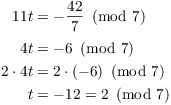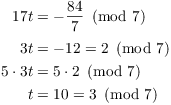In this section, I'll discuss how you solve polynomial congruences
mod a power of a prime. The basic idea is to "lift"
solutions one power at a time: Start with solutions mod p. Lift them
(if possible) to solutions mod ![]() . Lift those (if possible) to solutions mod
. Lift those (if possible) to solutions mod ![]() . And so on.
. And so on.
The general approach (where the modulus is composite) is:
1. Solve the congruence mod p, where p is prime.
2. Solve the congruence mod ![]() for
for ![]() , where p is prime.
, where p is prime.
3. To solve the congruence mod n, let ![]() . Use step 2
to solve the congruence mod
. Use step 2
to solve the congruence mod ![]() for
for ![]() , then use the Chinese Remainder Theorem to
put together the
, then use the Chinese Remainder Theorem to
put together the ![]() solutions to get
a solution mod n.
solutions to get
a solution mod n.
First, I'll show how to use a solution to a quadratic congruence ![]() for p prime to get a solution to
for p prime to get a solution to ![]() .
.
Example. Solve the quadratic congruence
![]()


![]() has solutions
has solutions ![]() and
and ![]() . (Note that
. (Note that ![]() .) I will try to "lift" one of
these solutions to a solution mod 169.
.) I will try to "lift" one of
these solutions to a solution mod 169.
Write
![]()
I will try to find z so that
![]()
In other words, I suppose that a solution mod 169 is congruent mod 13 to the mod 13 solution 5.
Substitute ![]() into
into ![]() and solve:
and solve:

I divide out the common factor of 26, dividing the modulus by ![]() :
:

Note that if ![]() , then
, then
![]()
Thus, any z which equals 9 mod 13 will give the same solution ![]() .
.
Note that ![]() is another
solution. You can check that you get it by starting with the solution
is another
solution. You can check that you get it by starting with the solution
![]() to
to ![]() .
.![]()
The general theorem requires two preliminary results.
Lemma. If ![]() , then the product of k consecutive
integers is divisible by
, then the product of k consecutive
integers is divisible by ![]() .
.
Proof. First, if any of the consecutive
integers is 0, the product is 0, and it is divisible by ![]() .
.
Next, if all of the consecutive integers are negative, their product
is equal to ![]() times the product of k consecutive
positive integers.
times the product of k consecutive
positive integers.
Hence, it suffices to prove the result for positive integers: The
product of k consecutive integers is divisible by ![]() .
.
Write the k consecutive positive integers in descending order as
![]()
Then the product is
![]()
Therefore,
![]()
Proposition. Let ![]() , let
, let ![]() , and let p be prime. For all
, and let p be prime. For all ![]() ,
,
![]()
Proof. Let ![]() . Consider the Taylor expansion of f:
. Consider the Taylor expansion of f:
![]()
I need to show that
![]()
Since ![]() and
and ![]() ,
,
![]()
Hence, ![]() . This shows that the
result is true, provided that
. This shows that the
result is true, provided that ![]() is an integer.
is an integer.
Write ![]() . Then
. Then
![]()
Each coefficient ![]() has as a factor the product of j consecutive integers, which is
divisible by
has as a factor the product of j consecutive integers, which is
divisible by ![]() . Therefore,
. Therefore, ![]() is an integer, and the argument
above is complete.
is an integer, and the argument
above is complete.![]()
Theorem. Let ![]() , let
, let ![]() , let p be prime, and let c be a solution
to
, let p be prime, and let c be a solution
to ![]() .
.
(a) If ![]() , then
, then ![]() has a unique solution congruent
to c mod
has a unique solution congruent
to c mod ![]() . It is given by
. It is given by ![]() , where
, where
![]()
(b) If ![]() , then:
, then:
(i) If ![]() , then
, then ![]() has p solutions congruent to c
mod
has p solutions congruent to c
mod ![]() . They're given by
. They're given by ![]() for
for ![]() .
.
(ii) If ![]() , then
, then ![]() has no solutions congruent to c
mod
has no solutions congruent to c
mod ![]() .
.
Proof. Since ![]() , I have
, I have ![]() , and
, and ![]() is an integer.
is an integer.
Suppose first that ![]() . Then
. Then ![]() is invertible mod p. Let
is invertible mod p. Let
![]()
By the previous result

This shows that ![]() is a solution to
is a solution to ![]() , and clearly
, and clearly ![]() .
.
Reversing these steps shows that t is unique mod p.
Now suppose that ![]() . Then
. Then ![]() , so the previous result yields
, so the previous result yields
![]()
If ![]() , the equation says
, the equation says
![]()
Since t was arbitrary, this equation is satisfied for all of the p
distinct values of t mod p, namely ![]() .
.
Finally, if ![]() , the equation says
, the equation says
![]()
This means that for no t is ![]() a solution to
a solution to
![]() .
.![]()
Example. Solve the congruence
![]()
Step 1. Find solutions mod 7.

The solutions are ![]() and
and ![]() .
.
Step 2. For each solution c to the congruence
mod ![]() , determine whether p does or does not
divide
, determine whether p does or does not
divide ![]() and consider cases.
and consider cases.
Since ![]() , I have
, I have ![]() .
.
I have ![]() and
and ![]() . I have
. I have ![]() and
and ![]() .
.
I'll do ![]() first. Note that
first. Note that ![]() . Applying the first case of the theorem, I
solve:
. Applying the first case of the theorem, I
solve:

Hence, a solution mod 49 is given by ![]() .
.
Next, I'll do ![]() . Note that
. Note that ![]() . Applying the first case of the theorem, I
solve:
. Applying the first case of the theorem, I
solve:

Hence, a solution mod 49 is given by ![]() .
.![]()
Example. Solve the congruence
![]()
First, I find solutions to ![]() :
:

I get ![]() .
.
Take ![]() . Then
. Then ![]() . Then
. Then ![]() , and
, and ![]() . Therefore, we're in the second case of
the theorem.
. Therefore, we're in the second case of
the theorem.
Further, ![]() , and
, and ![]() . Hence, we're in the first subcase of the
second case, and
. Hence, we're in the first subcase of the
second case, and ![]() has 3
solutions congruent to 1 mod 3. They're obtained by adding multiples
of 3 to 1: We get
has 3
solutions congruent to 1 mod 3. They're obtained by adding multiples
of 3 to 1: We get ![]() .
.![]()
Copyright 2019 by Bruce Ikenaga